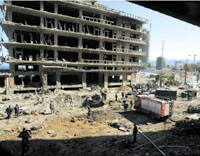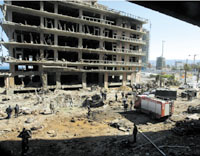
Yemen condemns Hariri’s assassination [Archives:2005/817/Front Page]
February 18 2005
 |
A spokesman of the Republic of Yemen denounced on Monday evening, February 14, the criminal act resulting in the death of Mr. Rafik al-Hariri, former Lebanese Prime Minister.
“This crime targets Lebanon's security, stability and national unity,” said the spokesman.
In a statement to Yemen Times, Dr. Abu Bakr al-Qirbi, Yemen's Minister of Foreign Affairs, said, “The Republic of Yemen calls on all Lebanese people including all sects and political forces to be aware enough not to get trapped by the conspiracy.”
He added that the crime targets Lebanon's security, stability and national solidarity, and tries to engender mischief, tear the country into shreds and spark differences in their lines.”
On the other hand, President Ali Abdullah Saleh had sent a cable of condolences to the Lebanese President expressing his heartfelt consolation over the death of Mr. Rafik al-Hariri, former Lebanese Prime Minister.
“We have sorrowfully received the news of the heart-breaking calamity which befell the brotherly Lebanese people by a criminal cowardly act resulting in the death of former Lebanese Prime Minister and a number of innocent victims,” the letter said.
President Saleh strongly expressed his denunciation and condemnation of the atrocious crime describing it as “a terrorist act” targeting Lebanon and its social peace.
Turmoil in Lebanon
Lebanese opposition leaders blamed Syria for the assassination of Rafik al-Hariri and mourners attacked Syrians with sticks and stones in the former prime minister's hometown in south Lebanon on Tuesday The Sunni Muslim billionaire's death in a car bomb blast on Monday has spotlighted Lebanon's troubled ties with its powerful neighbour and revived memories of the 1975-90 civil war.
“This (Lebanese) regime is backed by the Syrians. This is the regime of terrorists and terrorism that was able yesterday to wipe out Rafik al-Hariri,” Druze leader Walid Jumblatt said after presenting his condolences to Hariri's family in Beirut.
“I charge the Lebanese-Syrian police regime with the responsibility for Hariri's death,” he said.
Thousands of protesters took to the streets in the northern
Sunni port city of Tripoli and hundreds demonstrated in Hariri's hometown of Sidon, shouting slogans blaming Syrian President
Bashar al-Assad for his death, witnesses said.
A crowd of mourners assaulted Syrian workers near Hariri's brother's house in Sidon, injuring five of them. A Syrian lorry was set on fire in north Lebanon.
Exiled former general Michel Aoun, a Maronite Christian and long-time foe of Syria, said Damascus was indirectly, if not directly, responsible for the Hariri's killing.
“There are many Syrian and Lebanese intelligence services working in Beirut and they control everything in the country. I don't think that if they were taking care of Hariri he would be attacked so easily,” Aoun told Reuters by telephone.
Syrian Vice President Abdel-Halim Khaddam was among those who filed into Hariri's palatial home to pay condolences.
“This crime targeted the Lebanese dream, Lebanese security and Lebanese peace,” said Khaddam, a personal friend of Hariri.
Mosque minarets across Beirut blared out readings from the
Koran. Streets were deserted as schools, shops and offices shut for three days of official mourning. The Lebanese army went on alert ahead of Hariri's funeral, planned for Wednesday.
Hariri, 60, who masterminded postwar reconstruction, was killed along with 14 other people when a car bomb ripped through his motorcade in Beirut's seafront luxury hotel district. About 135 people were wounded in the biggest explosion since the war.
Suicide bombing
Interior Minister Suleiman Franjieh said a suicide car bomber might have carried out the attack, which gouged a crater in the middle of the road as Hariri's convoy drove by.
“It could have been that someone was driving the car and it might have a been a suicide (attacker) who blew himself up,” he told a news conference, citing initial investigations.
A previously unknown Islamist group said on Monday it had carried out a suicide attack against Hariri, who also holds Saudi citizenship, because he supported the Saudi royal family.
Hours later Lebanese security forces said they had raided the Beirut home of a man they identified as a Palestinian who had read the videotaped claim of responsibility. A security source said Ahmed Tayseer Abu Adas was not in the house.
Hariri resigned as prime minister in October after falling out with Syria over its role in extending the term of his political rival, President Emile Lahoud.
He then joined opposition leaders in calling for Syria to withdraw its 14,000 troops and stop interfering in Lebanese affairs, as demanded by a U.N. Security Council resolution.
Political tension had already been building up in Lebanon as campaigning got under way for parliamentary elections in May, which were widely seen as a test of Syria's influence.
Franjieh said Hariri's death would not derail the poll, saying: “Certainly, the elections will take place on schedule.”
Syrian state media said Syria had embraced Hariri “as one of its own sons” and condemned his killing.
“Matters should be put on the right track ) the real target of the assassination of Hariri is Lebanon and its national unity and civil peace,” al-Thawra newspaper said.
The United States, which has tightened pressure on Syria in recent months, said it would consult U.N. Security Council members about punitive measures. The council was due to meet formally later on Tuesday to discuss Hariri's killing.
Since it helped broker the end of the war, Syria has maintained a pervasive grip on Lebanon through its intelligence services, political allies and economic interests.
Lebanese papers voiced fears the killing could destabilize the country and open the door to international intervention.
“The pressing concern of the moment is how to prevent Lebanon from tottering over the brink of the abyss,” said the English-language Daily Star.
——
[archive-e:817-v:13-y:2005-d:2005-02-18-p:front]


